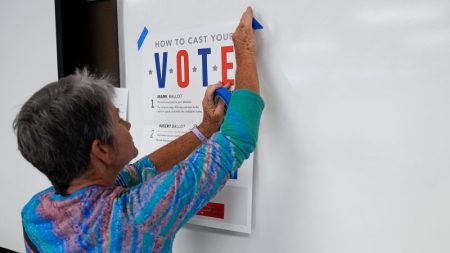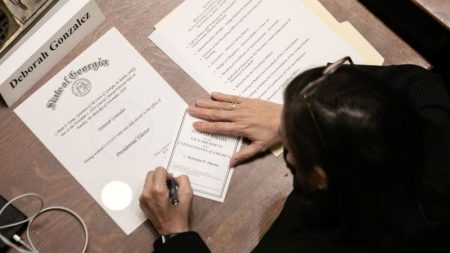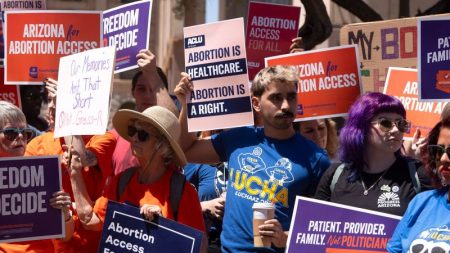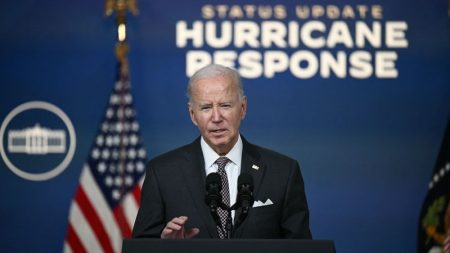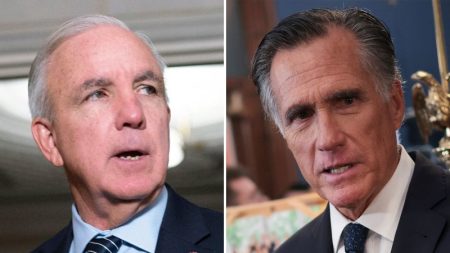A version of this story appeared in CNN’s What Matters newsletter. To get it in your inbox, sign up for free here.
The ultimate winner of the Republican presidential primary is TBD, but the primary campaign has already had an effect on the direction of the party, which continues to reckon with former President Donald Trump’s populism.
The GOP’s major candidates have crystalized on certain key issues (deporting millions of migrants) and fractured on others (reforming Social Security and Medicare).
These tectonic policy movements were on display Wednesday night at CNN’s primary debate in Iowa featuring former South Carolina Gov. Nikki Haley and Florida Gov. Ron DeSantis and at a Fox News town hall featuring debate no-show Trump.
The view held by the major GOP presidential candidates that millions of undocumented immigrants currently in the US must be deported represents a striking shift for the party.
A surge of migrants and asylum-seekers crossing the US border in recent years has been a motivating issue for Republicans concerned about border security. Trump, who built his first presidential campaign on promises to build a wall on the southern border, has long expressed admiration for a 1950s mass-deportation effort.
CNN reported in November about his plans, if reelected, to amp up his immigration hard line with the building of large camps to house migrants waiting for deportation and tapping federal and local law enforcement to assist with large-scale arrests of undocumented immigrants across the country.
While Haley and DeSantis did not weigh in specifically on those ideas Wednesday night, they were asked by debate moderator Jake Tapper about the estimated more than 10 million undocumented immigrants already living in the US.
“The number of people that will be amnestied when I’m president is zero,” DeSantis said, when asked if he would allow any of the 10 million to stay in the US.
“You have to deport them,” said Haley. “And the reason you have to deport them is they’re cutting the line.”
Setting aside the logistical challenge and cost of deporting more than 10 million people, and the complete inability of Congress to come together on the border issue, the fact is that the major, remaining Republican presidential candidates now all endorse the idea of mass deportation.
That’s a long-term shift for the party. Former President George W. Bush endorsed a bipartisan immigration plan in the early 2000s that included a pathway to citizenship for the undocumented. So did the late Sen. John McCain, who was the GOP nominee in 2008.
Mitt Romney, now a senator from Utah, was on board with encouraging the undocumented to self-deport. “We’re not going to round people up,” Romney said during a debate in 2012.
Specifics are lacking from today’s Republican candidates, but they are all essentially on the same page on immigration.
While they agree on deportations, the GOP candidates are split on Social Security and Medicare.
These programs, which Americans pay into during their working lives, are in danger of not being able to pay full benefits in the coming decades. Social Security won’t have enough money to cover all of its benefits in 10 years if Congress doesn’t act, according to current projections.
Haley has been out front in arguing that tough decisions need to be made. She says seniors currently getting benefits should be walled off from the discussion and that people in their 20s should be told now that the retirement age will need to be raised.
For this reason, Trump has been criticizing Haley for wanting to reform Social Security. He released a new video making the argument, and at the Fox town hall, he said both Haley and DeSantis want to cut benefits, which is not completely accurate about either candidate.
DeSantis actually has followed Trump’s lead on this, and at CNN’s debate he sounded almost progressive in the moment when he described the programs not as entitlements but as a form of social insurance.
“Seniors out there: A promise has been made to you,” he said. “You’ve paid into this. Every single paycheck that you’ve had your entire life, they’ve taken money out of, and that promise needs to be fulfilled.”
As a member of Congress, DeSantis voted for controversial budget resolutions that would have raised the retirement age to 70, CNN’s Andrew Kaczynski and Em Steck noted last year.
On Wednesday, DeSantis cited recent data showing the US life expectancy has dropped.
“I would never raise the retirement age in the face of declining life expectancy,” DeSantis said. “That hurts blue-collar folks,” he added. “You get taxed your entire life, life expectancy’s down, you may not even be recouping very many benefits.”
Read CNN’s fact check of his claim about life expectancy, which has a lot to do with the large number of people who died during the Covid-19 pandemic. DeSantis was critical of state governments for efforts to contain that crisis.
He also noted that his grandmother lived to the age of 91 and that Social Security was her only source of income.
People generally living longer and receiving benefits for more years has a lot to do with the imbalance in the program. As the Tax Policy Center recently explained, benefits paid to Social Security recipients in coming decades will exceed and could even be double the taxes they pay during their working lives.
“We have to keep our promises to seniors, but we also can’t put our head in the sand,” Haley said, arguing for both a higher retirement age for workers currently in their 20s and limits on benefits for the wealthy. This might be important nuance, but it is lost in the ads attacking her for wanting to change the programs for future generations.
The financial situation of Social Security has only worsened in recent years, but Haley’s position on the need for reform feels like a throwback to campaigns of yore, when DeSantis was voting for those budget resolutions to change the retirement age. Today, on this issue, he’s following Trump.
Read the full article here




